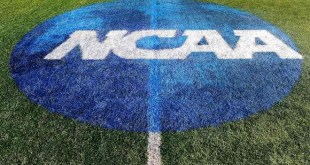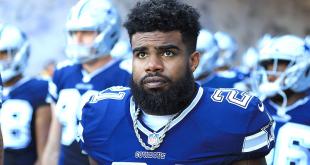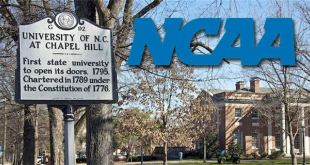The NCAA is at a tipping point. A chorus of critics in the media. Growing unrest among college athletes. Lawsuits by the dozens, with system-threatening cases over compensation and unionization. Why is the NCAA in such a precarious position and where should it go from here? This series will examine the NCAA’s approach to amateurism and what amateurism’s future should look like. In Part One, I explain the NCAA’s conception of amateurism and why it acts to protect the current system.
What is Amateurism?
The NCAA is committed to the principle of “amateurism.” The NCAA’s conception of amateurism is that athletes’ “participation should be motivated primarily by education and by the physical, mental and social benefits to be derived.”[i] Amateurism’s basic purpose “is to maintain intercollegiate athletics as an integral part of the educational program and the athlete as an integral part of the student body and, by so doing retain a clear line of demarcation between intercollegiate athletics and professional sports.”[ii] Moreover, athletes “should be protected from exploitation by professional and commercial enterprises.”[iii]
Athletes can lose amateur status by using their athletic skills “directly or indirectly” for pay in a sport, by accepting a promise of future pay, or by contracting with an agent (among other reasons).[iv] The NCAA’s conception of amateurism attempts to integrate athletes into the educational experience and academic communities of their schools. The NCAA maintains that paying athletes for their play in a sport is at odds with member schools’ educational mission.
Compensation and Amateurism
It’s clear that colleges directly paying athletes would violate the NCAA’s principle of amateurism. But the NCAA’s stance is broader than direct payment. Simply allowing athletes to earn compensation, even from sources besides colleges themselves, even for publicity rights such as licensing their names, images, and likenesses (as opposed to actual pay for play), violates the NCAA’s understanding of amateurism.
The NCAA has prohibited athletes from licensing their publicity rights to third parties and has insisted on a “clear line of demarcation” between college and professional sports. Earning compensation from publicity rights would currently result in athletes losing their amateur status because they would be receiving pay indirectly related to their play in a sport.
The NCAA has a number of justifications for its amateurism scheme. Paying athletes could hurt consumer demand for college sports, reducing the likelihood that people will be interested in watching sports played by what some may view as “semi-professionals” earning money indirectly from playing sports. Moreover, the NCAA argues that compensation will harm competitive balance, enabling schools with more money to pay athletes more and therefore monopolize talent. Even with compensation in the form of endorsement deals, higher profile programs could promise athletes greater publicity and therefore a greater likelihood of endorsement contracts.
Compensating college athletes could hurt the integration of the athlete into the greater school community by damaging relationships with other students, teammates, or coaches who could be making significantly less money than star athletes. The NCAA also has argued that allowing third-party payment, for example in the form of endorsements, would distract college athletes from their educational opportunities. This argument is related to another concern of the NCAA’s – that college athletes will be exploited and over-commercialized. Some would argue that this is already the status quo; the NCAA maintains that this isn’t the case, but even if it were, that it would be worse in a world of compensation.
Amateurism under the Law
In the context of antitrust law, the NCAA argues that there are procompetitive benefits to preserving amateurism in college athletics including increasing consumer choice by providing the unique product of college sports, increasing consumer demand for that product, increasing output by making games possible, maintaining competitive balance, and furthering the integration of athletics and education.
Courts have generally given broad deference to the NCAA’s amateurism restrictions. Unlike normal restraints of trade which are held to be “per se” illegal under antitrust law, the Supreme Court has held that the NCAA’s rules ought to be analyzed using the “rule of reason” because the unique nature of college sports means that certain restrictions are actually procompetitive.[v] But the NCAA’s rules must still be reasonably tailored to its procompetitive objectives. If courts find that the NCAA’s rules are more restrictive than necessary to achieve amateurism, they can strike down the rules under antitrust law.
Recently, the NCAA received a boost from the Ninth Circuit in the O’Bannon case, in which the court stated that “the difference between offering student-athletes education-related compensation and offering them cash sums untethered to educational expenses is not minor; it is a quantum leap.” In doing so, the court did qualify its decision by stating that “amateurism rules’ validity must be proved, not presumed.” But the court suggested that the O’Bannon plaintiffs’ alternative proposal of deferred payments to athletes after college would not promote amateurism as well as the NCAA’s current system.
Allowing athletes to earn compensation could also expose the NCAA to more antitrust litigation. If the NCAA is willing to allow athletes to earn money from third parties, why not pay the athletes directly? If players can earn money for their publicity, doesn’t that mean their goal for participation in athletics will no longer be to play the game for its “physical, mental, and social benefits,” but to become famous and earn money? If one aspect of the NCAA’s amateurism system falls, some will attempt to bring down the whole edifice.
Now that we have a framework for understanding amateurism as the NCAA sees it, the rest of the series will examine responses to the NCAA’s conception of amateurism and what potential alternatives look like.
[i] NCAA Const. Art. 2.9.
[ii] NCAA Const. Art. 1.3.1.
[iii] Id.
[iv] NCAA Bylaws Art. 12.1.2.
[v] NCAA v. Board of Regents, 468 U.S. 85 (1984).
 The Sports Esquires Putting Sports on Trial
The Sports Esquires Putting Sports on Trial





One comment
Pingback: Sports Law Links - The Sports Esquires